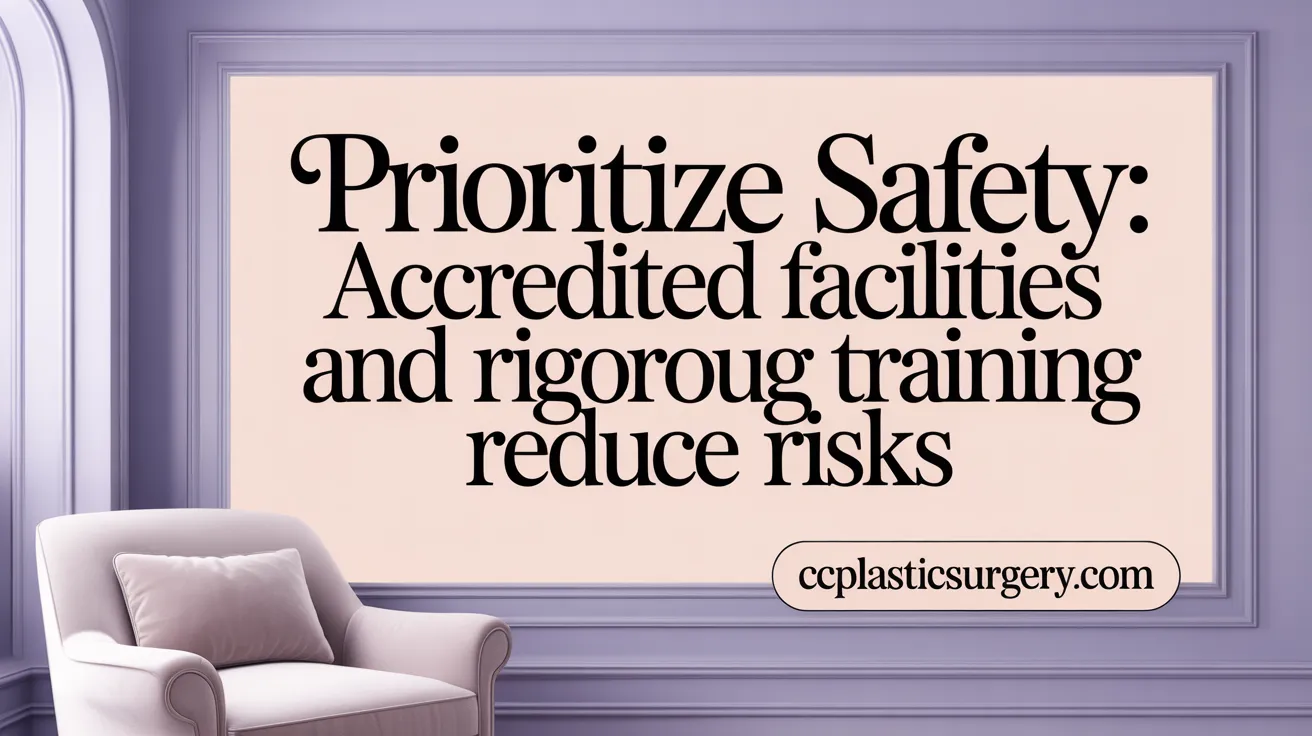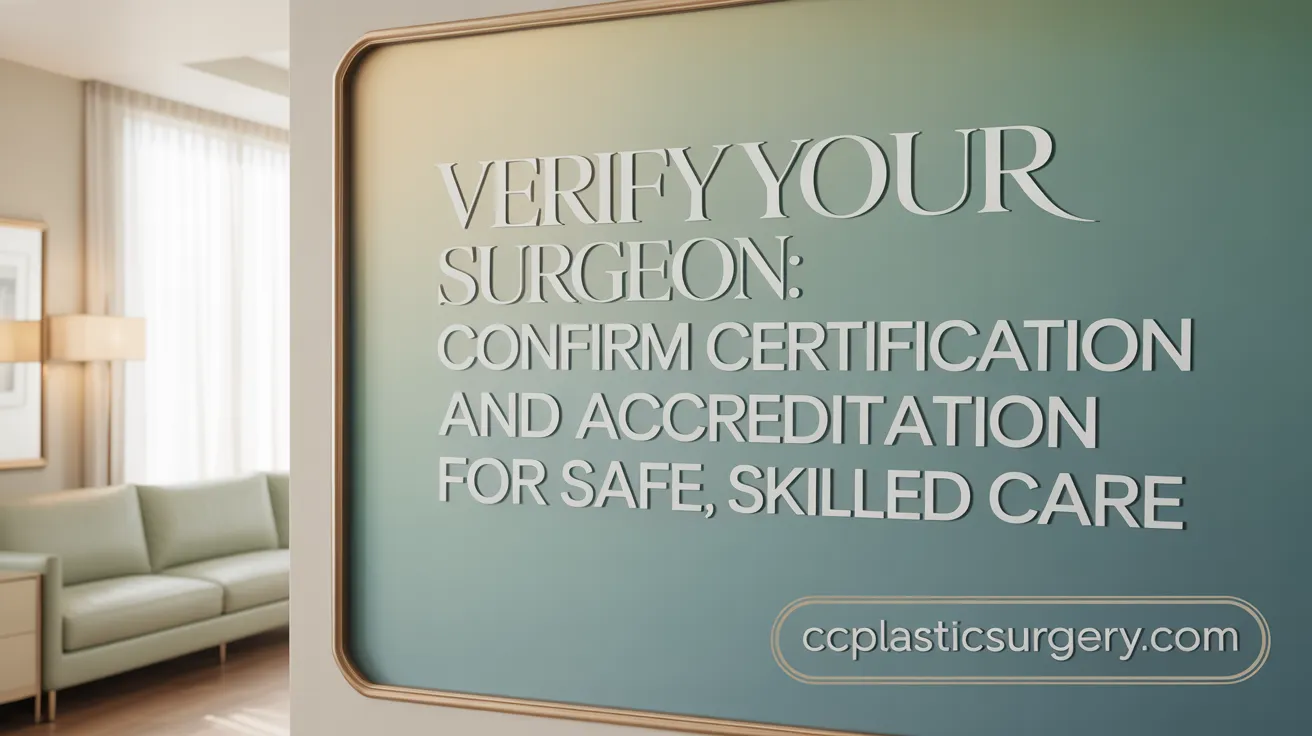
February 15, 2026
What Is Sculptra Treatment A Guide to Rebuilding Your Natural Collagen
What is Sculptra treatment? Explore how this unique collagen stimulator works to gradually restore facial volume for natural, long-lasting rejuvenation.
Nov 13, 2025

Board certification in plastic surgery signifies that a surgeon has met high standards of education, training, and professional competence.
The ABPS is the only certifying board recognized by the American Board of Medical Specialties for plastic surgeons. It certifies surgeons who specialize in both cosmetic and reconstructive plastic surgery.
Becoming board certified requires approximately sixteen years of education after high school, including medical school, a generalized surgical residency, and specialized plastic surgery training. Surgeons must pass a comprehensive written exam and a demanding two-day oral exam evaluating their knowledge, skills, ethical standards, and safety practices.
Certification ensures surgeons have completed extensive hands-on training and uphold strict ethical and safety standards. This commitment to excellence translates to better patient outcomes, enhanced safety, and higher satisfaction with surgical results. Choosing an ABPS-certified surgeon provides assurance of the highest level of expertise and ongoing education in the ever-evolving field of plastic surgery.
Board certification by the American Board of Plastic Surgery (ABPS) represents a surgeon’s commitment to the highest standards of training, ethics, and patient safety in plastic surgery, including passing rigorous board certification written and oral exams.
Achieving this certification requires approximately sixteen years of post-secondary education and clinical training. This extensive path includes medical school, followed by a dedicated plastic surgery residency, and specialized fellowship training that provides experience in both reconstructive and cosmetic procedures, aligned with the training and education of plastic surgeons.
Surgeons must successfully pass a demanding written examination and a comprehensive two-day oral exam. These assessments evaluate their medical knowledge, decision-making skills, ethical principles, and ability to manage surgical complications effectively, which are essential components of the board certification process.
Certification is not a one-time achievement. Board-certified plastic surgeons engage in continuous professional development and learning through ongoing education and must periodically reassess their skills and knowledge to maintain their certification. This process ensures they stay current with medical advances and safety protocols, reflecting the highest ethical standards and commitment to professional development.
The certification process also underscores a surgeon’s dedication to ethical practice and prioritizing patient safety. These surgeons adhere to strict safety standards, operate in accredited surgical facilities and patient safety, and follow evidence-based medical guidelines to optimize patient outcomes and reduce the risk of complications.
Choosing a board-certified plastic surgeon guarantees working with a highly trained, evaluated, and ethically grounded professional focused on delivering safe, effective, and personalized patient care.

Board-certified plastic surgeons adhere to strict safety protocols and perform surgeries exclusively in accredited surgical facilities and patient safety, such as those accredited by the JOINT COMMISSION (JCAHO) or the American Association for Accreditation of Ambulatory Surgery Facilities (AAAASF). This ensures that the environment meets high standards for patient care, anesthesia safety, and emergency preparedness.
Their extensive training, which includes several years of specialized residency and fellowship, equips them with the knowledge and skills to prevent and effectively handle surgical emergencies or unexpected complications. This readiness significantly reduces risks during procedures.
Research consistently demonstrates that patients operated on by board-certified surgeons experience notably lower rates of complications and mortality compared to those treated by non-certified physicians. This correlation highlights the value of rigorous certification standards that emphasize patient safety and ethical practice.
Overall, board certification is a dependable indicator of a surgeon’s commitment to patient well-being, as it requires continuous education and evaluation, promoting up-to-date techniques and strict adherence to evidence-based medical standards for optimal surgical outcomes.

Patients tend to trust board-certified plastic surgeons more because these surgeons have proven expertise and adhere to high ethical standards. This trust is crucial as it fosters open communication, enabling patients to ask questions freely and fully understand the procedures involved.
Board certification reassures patients that their surgeon has undergone rigorous training and is committed to safe, ethical practices. This confidence improves patient engagement, making it easier for surgeons to educate patients about realistic outcomes, risks, and recovery processes.
Board-certified surgeons prioritize personalized care. They conduct detailed consultations to develop tailored treatment plans suited to each patient's unique goals and needs. Additionally, they offer continuous support before, during, and after surgery to ensure optimal recovery and satisfaction.
Patients are encouraged to review before-and-after photos of previous patients, especially those with similar concerns, to assess the surgeon's aesthetic sense and results. Reading patient testimonials helps gauge satisfaction levels and trustworthiness, supporting informed decision-making when selecting a surgeon. For guidance, see Choosing a Cosmetic Surgeon.

Patients can confirm a surgeon’s board certification by checking reputable sources like the American Board of Plastic Surgery (ABPS) and the American Society of Plastic Surgeons (ASPS) online directories. These platforms verify that the surgeon has successfully completed extensive education, including medical school, specialized residency training, and rigorous written and oral exams (board-certified plastic surgeon).
Not all physicians performing cosmetic procedures are board certified in plastic surgery. Some may be certified in general surgery, dermatology, or other specialties without specific plastic surgery training. Board-certified plastic surgeons have completed a minimum of five years of post-graduate training in plastic surgery and adhere to strict ethical and safety standards, significantly improving patient outcomes and reducing surgical complications (importance of surgeon certification).
Membership in the ASPS signals that a surgeon meets demanding professional criteria including ABPS board certification, graduation from accredited medical schools, and completing surgeries only in accredited surgical facilities and patient safety. ASPS members commit to ongoing education and ethical practice, reinforcing patient safety and surgical quality (Selecting a qualified plastic surgeon).
Safe surgical outcomes are also linked to the surgical environment. Board-certified plastic surgeons perform procedures in accredited facilities approved by organizations such as the Joint Commission (JCAHO), the American Association for Accreditation of Ambulatory Surgery Facilities (AAAASF), or the Accreditation Association for Ambulatory Health Care (AAAHC). These accreditations ensure strict adherence to safety protocols and high standards of care (Finding the right plastic surgeon).
Verifying a surgeon’s credentials and certification status, confirming ASPS membership, and ensuring surgery will be performed in an accredited facility are vital steps in choosing a qualified, safe, and skilled plastic surgeon. These measures provide patients with confidence, optimal results, and enhanced safety throughout their surgical journey (benefits of choosing a certified plastic surgeon.

Board-certified plastic surgeons are highly trained professionals with comprehensive expertise in both cosmetic and reconstructive procedures. Their extensive training encompasses a wide variety of surgeries, including advanced facial aesthetic procedures, breast surgery, and body contouring.
This broad scope of practice enables them to address diverse patient needs with skill and precision. In many cases, surgeons complete fellowship programs focused on specific specialties such as facial aesthetics or body contouring, which enhances their proficiency and artistic judgment.
Continuing education and maintenance of certification ensure that these surgeons stay current with the latest techniques and safety protocols. Additionally, those who hold double board certification—being certified in both plastic surgery and general surgery—bring an even deeper level of expertise. This dual certification signifies thorough training and mastery of complex surgical principles, leading to improved patient safety and optimal outcomes.
Choosing a surgeon with this breadth of expertise ensures personalized care and the best possible results for patients seeking cosmetic or reconstructive surgery.
Board-certified plastic surgeons have completed extensive training, including medical school, residency, and specialized plastic surgery education. This rigorous process involves around sixteen years of post-high school education along with passing demanding written and oral exams. Their certification guarantees proficiency in both cosmetic and reconstructive surgery procedures.
Patients can verify a surgeon’s certification through trusted organizations such as the American Board of Plastic Surgery (ABPS) and the American Society of Plastic Surgeons (ASPS). These credentials confirm the surgeon meets established ethical standards and maintains ongoing education to stay current with surgical advancements.
Choosing a board-certified plastic surgeon ensures adherence to the highest safety protocols and ethical practices. These surgeons perform procedures in accredited facilities and prioritize patient well-being by offering personalized consultations, customized treatment plans, and comprehensive support. This dedication contributes significantly to better surgical outcomes and patient satisfaction.

February 15, 2026
What is Sculptra treatment? Explore how this unique collagen stimulator works to gradually restore facial volume for natural, long-lasting rejuvenation.

February 14, 2026
Learn how to tighten facial skin naturally with proven skincare, exercises, and diet. Our guide offers actionable tips for achieving firmer, more youthful skin.

February 13, 2026
Considering Kybella for under chin fat? Learn how it works, what to expect, costs, and if you're a candidate in our complete guide to jawline contouring.